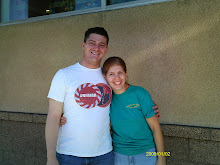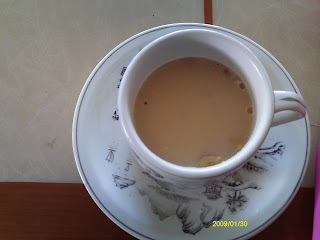On the first Saturday in Chungju (Oct. 24) Liz and Ashley, the girls I met at Jungsan High School, came to my apartment for a visit and a taste of good ol' American food. They later took me out on the town. As Liz told me later that day, "If you not invite us, I think your Saturday would be boring." We had a wonderful time!
For lunch, I decided to make one of my favorite childhood dishes, Two-Bean Chili--which became No-bean chili when I couldn't find the beans. I added chips and salsa as an appetizer to make the whole meal have a more Tex-Mex kind of flair, just the way I like it. As this was my first attempt at salsa, it turned into pico de gallo instead. Because Korea hasn't discovered tortilla chips yet (or at least I haven't discovered them here), I settled for Sun chips--which I thought was an unexpected but tasty find. I tried my pico for the first time before the girls arrived and noticed it had quite a kick; I congratulated myself on my culinary prowess, until days later I discovered that I hadn't seen the chili pepper on the side of my chip package. I guess I made gringo pico, after all. Any pico at all is still impressive in Korea, I think.
The girls arrived promptly at 12:30. They had brought with them Korean snacks, tea, and ramen noodles as gifts. The gesture made me feel accepted into their lives and culture. Apparently Koreans waste no time, because in the first moments of entering the apartment, Liz grabbed her throat and confessed, "Teacher, teacher, I thirsty." I laughed a little, gave her a drink, and we all sat down to eat. They seemed to really enjoy the meal; I don't know how different it is from their regular fare. I greatly enjoyed it because it reminded me of home and my family. It was a little sweet, but just spicy enough for me to appreciate. I asked if it was too spicy for them and they said no. What I made was probably extremely mild in comparisson to what they're used to.
After lunch, they asked me if I wanted to go shopping. I had been secretly hoping that they would go with me, anticipating the day just so I could ask. Since I had nothing else to do until 8 p.m. that day, it was set. They wanted to go see a movie first and then go shopping, but it turned out that the action thriller they had picked out (one of only two English movies availible) was rated R and they were only 17. I wouldn't have enjoyed the movie even if we had gone. It was the first time I had been to a theater, though, so it was good for me to look around. Because of a shortage of space, Korean theaters are considerably smaller than San Antonio theaters and have shops inside them, which I found surprising. This one reminded me of the one at the Quarry Market because we had to go up an escalat0r to get to it, but it was much less decorated.
As seeing the movie was a bust, our second stop was to find stationery. We went into a very girly store called Comma, which reminds me a lot of a bigger version of Claire's. They sell things from notebooks to watches, even to little tea sets. I hadn't been in it yet because each time I had passed it, I was with Andy and Brandon and I figured they wouldn't have enjoyed it very much. After Comma, I told them that I wanted to find some knee-high boots, so we stepped into a shoe store.
I have to confess: shoes in Korea are outlandish at best, though there are some occasional muted styles. As we browsed the iasles of the store, I found shoes that were a cross between lace-ups and high-heeled pumps. I didn't think I could pull off a style like that, so I kept looking. I've noticed a lot of people wearing them on the streets, though. They seem to be functional--keeping your shoe attached to your foot when normal pumps tend to slip off--so they could be worth a try. But I was there for boots, not more tennis shoes. I found some brown leather high-heeled boots. They're not cowboy boots, mind you, but they go up almost to my knee and seem to be very warm. The girls helped me find my size--a 250 in Korean sizes-- and I bought them for 39,000 won, which I thought was a steal considering the cost amounted to less than $37 USD. You can't really find a good, fashionable shoe like that, especially boots, in the States for that little.
After the shoe store, we decided to browse a clothing store to do some window shopping. Come to find out, my fashion leaves a lot to be desired in the eyes of a Korean teenager. According to my young guides, I need to wear baggy shorts with stockings and a one-size-too-large plaid button-down shirt in order to be fashionable. If I didn't like that, I could always wear an oversized sweater with leggings. They picked out outfits for me that I probably would never wear and Liz tried to find me a nice hoodie. I actually found a cropped blazer that I thought would be nice, but couldn't find it in my size.
I needn't have worried about the spice, because during our outing, they took me to a street vendor to have "a snack" called dok-bo-ke (which can also be eaten as a meal), thick rice noodles lathered in a sauce made from Korean red peppers. It was way too much for me to handle! I may have eaten 2 two-inch noodles from the whole plate and I still thought it was hot! Th girls just snacked away, as if there were nothing wrong. If I couldn't have handled intense Mexican food back home, I'm not sure why I decided to come to Korea. Thankfully, they also ordered some fried rice noodles wrapped in seaweed for me to try, which was almost bland in comparisson.
The outing was wonderful, all in all. I learned a bit of Korean consumer-culture and introduced my young friends to a bit of southern pride. It would be wonderful to do it all over again.
 ed Western seat cushions without the annoying ties in the back. Our table itself had a large circle cut out in the middle with metal groves inset in the space left behind, the place where the pot of scalding wood chips, Korea's barbeque pit, would go. The ceiling had metal piping running along it with vertical pipes extending down to each table past eye-level; these were the exhaust pipes, I was told. Imagine the amount of smoke generated by a pit like that at every table! First they brought out the fixin's: kimchi (of course, a staple side dish), coarse salt, wasabi-soybean sauce, black bean paste, sliced garlic, raddish slices, vinegar-soaked cucumbers, lettuce (to wrap the meat in), and shredded cabbage with drizzled wasabi-mustard. Then they brought the chopped duck and grilled it right before our eyes.
ed Western seat cushions without the annoying ties in the back. Our table itself had a large circle cut out in the middle with metal groves inset in the space left behind, the place where the pot of scalding wood chips, Korea's barbeque pit, would go. The ceiling had metal piping running along it with vertical pipes extending down to each table past eye-level; these were the exhaust pipes, I was told. Imagine the amount of smoke generated by a pit like that at every table! First they brought out the fixin's: kimchi (of course, a staple side dish), coarse salt, wasabi-soybean sauce, black bean paste, sliced garlic, raddish slices, vinegar-soaked cucumbers, lettuce (to wrap the meat in), and shredded cabbage with drizzled wasabi-mustard. Then they brought the chopped duck and grilled it right before our eyes.  sked David. "About cole slaw? This is it!" It reminded me of the sweet slaw that my grandma makes--I had found southern-tasting cole slaw in a far away place like Chungju! I ate the whole plate and my companions asked if I wanted more. "I'm good," I said. I sat there savoring the familiar taste, remembering my dear, sweet family. I thought about the other sensations from the meal as well: the smell of wood burning; cucumbers that tasted like sweet pickles; and juicy, smoked meat. It all reminded me of real Texas barbeque, as if I were enjoying the familiar tastes of home. I couldn't have asked for a better Thanksgiving than that!
sked David. "About cole slaw? This is it!" It reminded me of the sweet slaw that my grandma makes--I had found southern-tasting cole slaw in a far away place like Chungju! I ate the whole plate and my companions asked if I wanted more. "I'm good," I said. I sat there savoring the familiar taste, remembering my dear, sweet family. I thought about the other sensations from the meal as well: the smell of wood burning; cucumbers that tasted like sweet pickles; and juicy, smoked meat. It all reminded me of real Texas barbeque, as if I were enjoying the familiar tastes of home. I couldn't have asked for a better Thanksgiving than that! 
 A map of the greater Chungju area, though unsure of the scale
A map of the greater Chungju area, though unsure of the scale The view from my window. Waking up to sunshine and mountains is a beautiful thing!
The view from my window. Waking up to sunshine and mountains is a beautiful thing! A look at my apartment building (tall one on the right)
A look at my apartment building (tall one on the right) View from the corner where I stand every morning to catch my ride to work
View from the corner where I stand every morning to catch my ride to work
 As seen during the day and at night, the street I walk on every day to get either to the market, the store, or the PC Bang (for internet access, yay!)
As seen during the day and at night, the street I walk on every day to get either to the market, the store, or the PC Bang (for internet access, yay!)









 As part of the adventure, we were given a tour of the facilities. These ceramic pots are used to ferment the community's soybeans and red peppers into paste, staples of the Korean diet.
As part of the adventure, we were given a tour of the facilities. These ceramic pots are used to ferment the community's soybeans and red peppers into paste, staples of the Korean diet.  The friend that I made while I was chopping cabbage!
The friend that I made while I was chopping cabbage! 


